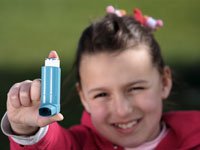Researchers Reconsider the "Hygiene Theory"
A study of 4,000 children over eight years has found that the 'hygiene theory' is probably wrong.

The "hygiene hypothesis" is a theory that young children who are exposed to a variety of germs will have a lower risk of developing asthma and allergies later in life.
The researchers found no evidence that mixing with other children protected against allergies and asthma.
Lead author Dr Johan C de Jongste, of Erasmus University in the Netherlands said: "We found no evidence for a protective or harmful effect of day care on the development of asthma symptoms, allergic sensitisation or airway hyper-responsiveness at the age of eight years.
"Early day care was associated with more airway symptoms until the age of four and only in children without older siblings, with a transient decrease in symptoms between four and eight years."

Parents completed detailed questionnaires during pregnancy, at three months and one year and then annually until the child reached the age of eight, with answers on their child's day care and symptoms.
Children who started day care before the age of two were twice as likely to have wheezing in the first year of life than those who did not go to day care.
By the age of five the trend was no longer statistically significant and by the age of eight there was no link found between day care and wheezing.
Those who started day care later showed a similar but non-significant trend and there was no difference between boys and girls in the study.
Children who went to day care early and had older brothers or sisters wheezed the most, the study found, Telegrahp.com. uk reports
Subscribe to Pravda.Ru Telegram channel, Facebook, RSS!





